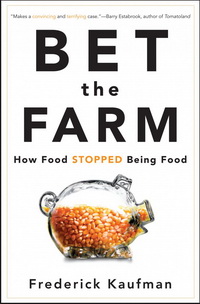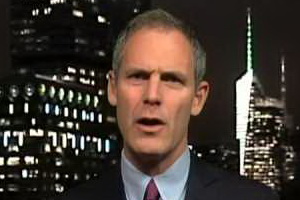Kaiyum reviews Frederick Kaufman’s investigative and electrifying book on how food stopped being food.

How does food get its price?
How is it possible that in a year like 2008 with record harvests yet another 250 million people plunged below the starvation line?
How is genetic engineering affecting food availability and food prices?
Where does sustainability come into the equation?
Can world leaders and food watch organisations really solve the supply and demand issue and ‘defeat’ starvation?
These and many more such questions are central to this fascinating and, for some, deeply disturbing investigation. Fascinating, because our food and food supply systems are in no way as they appear to be; disturbing, perhaps, because of what the writer uncovers about the inadequacies, inconsistencies and vulnerability of these systems and how they are governed and above all influenced by unexpected factors.
Author
 The writer, Frederick Kaufman, is a contributing editor at Harper’s Magazine. He also teaches at the City University of New York’s Graduate School of Journalism. With a long history of writing about food and food culture, he has spoken about food justice and food politics at the General Assembly of the UN and appeared on a wide variety of TV and radio shows, including the BBC World Service.
The writer, Frederick Kaufman, is a contributing editor at Harper’s Magazine. He also teaches at the City University of New York’s Graduate School of Journalism. With a long history of writing about food and food culture, he has spoken about food justice and food politics at the General Assembly of the UN and appeared on a wide variety of TV and radio shows, including the BBC World Service.
Quest
He perceived the reality that food is becoming less healthy, less delicious and more expensive even as the world’s biggest food companies and food scientists say that things are better than ever and the rest of us should leave it to them to feed the world.
With this in mind he set out to discover how food stopped being food.
Extensive search
As befits an investigative and critical journalist, Kaufman ‘goes the extra mile’ in questioning the professionals involved in the food industry.
He visits corporate headquarters of Domino’s Pizza, Tyson Foods and Walmart. He describes how such giants organise their markets and pare prices. He visits a sustainability research centre, mega-farms, organic farms and numerous genetic modification laboratories.
He travels to Rome for the meeting of the UN Food and Agriculture Organization as well as getting involved in a number of other highly political meetings where food policies are discussed.
Finally he arrives at Wall Street and the Chicago Mercantile Exchange, where he discovers the answer that seemed to be getting more and more elusive.
While maintaining the suspense, you should know that money pouring into the global derivatives market in grain futures is at the heart of the staggering imbalances and rocketing food prices that are the current legacy of unwise politico-economic decisions in the last decades of the twentieth century.
Investigative journalism
As may be expected from a journalist of Kaufman’s stature, he provides an extremely well written investigative narrative that makes this book an excellent and educational as well as entertaining read.
The book is attractively designed and faultlessly presented – a fitting ‘packaging’ for Kaufman’s expert use of language.
Valuable
One thing is certain: this book provides both a shocking glimpse of the power behind global food and a profound understanding of what truly supports the system that has brought mass misery to such a large portion of the planet’s population.
Review by Kaiyum, Osho News




Comments are closed.